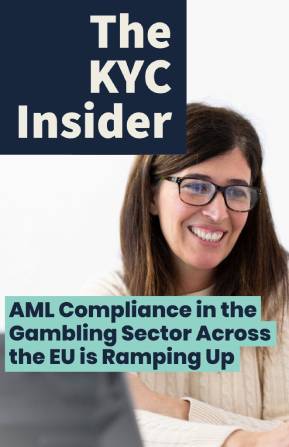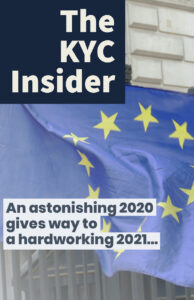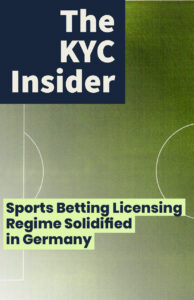

AML Compliance in the Gambling Sector Across the EU is Ramping Up
Bulgarian legislature abolishes State Gambling Commission
Bulgaria has amended its Gambling Act, with final approvals issued late July. Bulgaria’s Legislature will abolish their existing Gambling regulator, handing duties to the National Revenue Agency, while at the same time introducing new capital requirements for licensees. The changes are aimed at ensuring greater transparency and quality of the new Agencies duties.
The new bill introduces a more robust effort on the government’s part to maintain a level playing field and ensure that legal gambling operations will turn their attention toward Bulgaria’s lucrative market. AML and KYC compliance plays an important role in licensing requirements for all operators entering the Bulgarian market.
New capital requirements for licensees includes a BGN 1m (€511,000) capital requirement for slot licensees, a BGN 1.5m(€767,000) requirement for casino licensees and a BGN 3m (€1.53 mm) requirement for those offering online gambling. Bulgaria’s gambling sector has experienced a rocky time dealing with tax fraud, bribery and criminal charges against the head of the Gambling Sector.
Germany – Despite Friction Over Licensing Restrictions – The Market Is Predicted to Reach €3.3bn by 2024
By 2024, German gambling revenues are set to reach €3.3bn, this according to new market projections from research provider Goldmedia. This year has been turbulent for the gambling market and policy makers as preparations are underway for new licenses in sports betting (possibly this year), online casinos and poker licenses by next year, a new Gaming Authority, and a new 4thInterState Gambling Treaty. The measures and process has received much criticism over the past few years and in particular over the last few months. Since April the sports betting license application process has been halted, online casinos targeting German consumers have been warned that their operations are not legal without a license, and that consumers will no longer be able to use Visa or Mastercard services in payment transfers to and from online casino games. Visa made it clear that their cards shall not be used to accept deposits or withdrawals from online casinos.
Licenses for online poker and casino gambling are expected to be issued and come into force July 1, 2021. As Germany continues to prepare for sports betting and gambling and casino licenses possibly to resume later this year and casino / poker by July, 2021, recent comments from the European Gaming and Betting Association (EGBA) urge Germany to simply their policy framework. The EGBA supports Germany’s efforts to reform their Gaming markets in light of new license procedures, a new upcoming 4th InterState Treaty, and new Gambling Authority. Policymakers have set an ambitious agenda and supporters are urging German policy makers to consider simplifying the policy framework for online gambling.Poker and casino restrictions will include a maximum stake limit of €1 per spin on slots, a mandatory deposit limit of €1,000 across all operators, and no advertising for online gambling between 6am and 9pm. For sports betting, restrictions will limitlive betting to markets on the final result or next scorer. While the draft for the 4th InterState Treaty, the GlüNeuRStV, has been submitted to the EC earlier in May, it is still unclear when discussions on the licensing regime will commence. The ongoing “hold” on sport’s betting license applications is still in place and preparations remain underway. All licensed operators are subject to AML laws in Germany with implementation of KYC requirements. Companies have been warned that implementation of KYC measures is mandatory and non-compliance is subject to fine or license revocation.
The Netherlands – Remote Gambling Decree
The Dutch House of Representatives has voted on several new motions regarding the upcoming Remote Gambling Decree. The planned date for the Remote Gambling Act (RGA) to be implemented is still 1 January 2021 for land based gambling,and the remote gambling market to open on 1 July 2021. However, a motion requesting the possibility of a further delay was adopted.
Other notable motions that were adopted include:
- extending the cooling-off period with a possible delay of market opening date.
- reconsideration of the customer identification requirements for land based operators.
- involvement of the Ministry of Health, Welfare and Sport in the development of policy for gambling addiction and prevention.
The KSA has also published the technical specifications for CRUKS (the Central Exclusion Register). The KSA is now focused on informing land based operators only, with a test-environment available from July allowing land based operators to test their ability to connect with the CRUKS database. For remote gambling operators, participating in the CRUKS register begins later. At this time, remote gambling operators are encouraged to take note of the technical requirements for CRUKS. As with all other EU member states, the NL will require KYC compliance in accordance with AML laws.
The latest to come out of the Dutch Ministry for Legal Protection is their decision to ban any use of pre-existing databases for Dutch remote gambling players. This means, any remote gambling operator previously active in the Netherlands and regardless at which time, may not use its previous database to offer newly licensed offerings to players that were included in pre-existing databases. The existing operators and newly licensed operators all begin with new databases.
Land Registry in the UK to Accept e-Signatures
The UK’s Land Registry has announced it will now accept witnessed electronic signatures and will consider how to move forward with the proper QES for conveyancing matters. Over the next few weeks the Land Registry will be reviewing best practice options to make the QES more commonplace for further digital transactions.
Estonia’s July 1 deadline to Implement AML amendments including KYC compliance Pertains to Crypto License Holders
Estonia was seen as one of the first European countries to take a more open approach to crypto assets. Licenses were issued to more than 1,400 entities in a brief period of time. With stricter and new regulations introduced in March 2020, financial regulators have made the licence process more strict, and requires crypto service providers to completion tougher verification procedures.
Estonia’s new AML amendments established virtual currency service providers as equal to financial institutions under AML law. The deadline for implementing these changes for crypto service providers was the 1st of July in order to meet tighter AML procedures. The deadline has come and crypto service providers have been preparing their compliance requiremnts accordingly.
Under the amendments, crypto businesses must determine if new business relationships are established with persons outside of the European Economic Area/ EU or are e-residents of Estonia. License holders must also perform compulsory identification and verification of new customers when a business relationship is established. There are variations on the type of remote or digital identification that can be used based, on their residency status for instance. Aside from Estonia’s established eID system, video identification that allows for an electronic signature according to eIDAS regulation, is the alternate remote identity verification permissible.
Along with tighter KYC and internal CDD compliance demands, these amendments also place higher licensing fees on crypto service providers from a state fee of €345 to €3300, a share capital minimum increase from €2500 to €12,000, and the requirement to have a registered office or actual business located in Estonia. Non-compliance with the AML Act can lead to fines up to €400,000 and a revocation of their license.
For e-residents and residents outside of EEA countries any transaction is applicable, for EEA residents transactions must not exceed €15,000 per month and KYC compliance allows for technology that must include video identification. Businesses will need to have a payment account with a credit institution, an electronic money institution or a payment institution established in Estonia or within the EEA with cross-border services or a branch in Estonia. These amendments are new to crypto service providers and will be strictly enforced.
FCA Updates Brexit Preparations by end of Transition Period
The Financial Conduct Authority (FCA) recently updated their “Brexit” portal to further guide any FCA authorised firm in their preparations after the Transition period closes, December 31, 2020. EU law will apply to the UK for the duration of the transition period and both the UK and EU are working to reach agreements on future relationships after the UK’s exit from the Union.
Firms are advised to consider possible implications to their business connections, customers, and infrastructure should the UK and EU not agree to a free trade agreement. The UK will be making changes to its legislation, updating contracts on outsourcing, data sharing, and customer communications. A key area affected will be passporting, which allows EU regulated firms to establish a presence and provide services across borders within the EU without applications to individual EU regulators. The FCA confirms that passporting from the UK to the EU will end with the transition period. This will be critical for business and the FCA advises those firms to contact the appropriate EU regulators in order to ensure they are able to provide their services accordingly.
Firms are well advised to begin preparations as the Transition Period comes to a close by year’s end. The FCA portal will be updated regularly.
Get all information from our previous issues and Benefit from our deep knowledge and stay up-to-date on all regulatory changes within financial services, gaming and gambling, telecommunications and many more by subscribing to KYC Insider.






